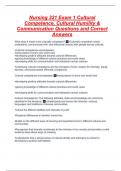Nursing 321 Exam 1 Cultural
Competence, Cultural Humility &
Communication Questions and Correct
Answers
What does it mean to be culturally competent? ✅•Culturally competent nurses
understand, communicate with, and effectively interact with people across cultures.
•Cultural competence encompasses:
•being aware of one's own world view
•developing positive attitudes towards cultural differences
•gaining knowledge of different cultural practices and world views
•developing skills for communication and interaction across cultures
•Underlying cultural competence are the principles of trust, respect for diversity, equity,
fairness, and social justice (Rhonda Livingstone).
Cultural competence encompasses ✅•being aware of one's own world view
•developing positive attitudes towards cultural differences
•gaining knowledge of different cultural practices and world views
•developing skills for communication and interaction across cultures
Cultural Competence: The following attitudes, skills and knowledge are commonly
identified in the literature: ✅•Understands and honors the histories, cultures,
languages, and traditions of diverse communities
•Values the different abilities and interests of youth
•Respects differences in families' home lives
•Builds on the different ways of knowing and expertise found in different cultures and
communities
•Recognizes that diversity contributes to the richness of our society and provides a valid
evidence base about ways of knowing
•Understands that a strong sense of cultural identity and belonging is central to
developing a positive self-esteem
, •Identifies and challenges their own cultural assumptions, values and beliefs
•Demonstrates an ongoing commitment to developing their own cultural competence
Definitions of Cultural Competence ✅•"The ability to interact effectively with people of
different cultures" (SAMHSA, 2016)
•"A congruent set of behaviors, attitudes, and policies that enable a person or group to
work effectively in cross-cultural situations; the process by which individuals and
systems respond respectfully and effectively to people of all cultures, languages,
classes, races, ethnic backgrounds, religions, and other diversity factors in a manner
that recognizes, affirms, and values the worth of individuals, families, and communities
and protects and preserves the dignity of each" (National Association of Social Workers,
2001).
•"The ability to recognize the significance of culture in one's own life and in the lives of
others; and to come to know and respect diverse cultural backgrounds and
characteristics through interactions with individuals from diverse linguistic, cultural, and
socioeconomic groups; and to fully integrate the culture of diverse groups into services,
work, and institutions in order to enhance the lives of both those being served by the
library profession and those engaged in service" (Overall, 2009, 189-190).
•"The ability to successfully teach students who come from cultures other than our own.
It entails developing certain personal and interpersonal awareness and sensitivities,
developing certain bodies of cultural knowledge, and mastering a set of skills that, taken
together, underlie effective cross-cultural teaching" (Diller & Moule, 2005).
•"High levels of respect for and knowledge of other cultures; actively working for and
with diverse groups" (Cooke, 2017, 18).
What is cultural humility? ✅•The concept of cultural humility was developed by Melanie
Tervalon and Jann Murray-Garcia in 1998 to address inequities in the healthcare field.
•It is now used in many fields, including education, public health, social work, and library
science, to increase the quality of interactions between workers and their diverse
community members.
-Cultural Competence is a Necessary Foundation for Cultural Humility
Cultural humility goes beyond the concept of cultural competence to include: ✅1.A
personal lifelong commitment to self-evaluation and self-critique
2.Recognition of power dynamics and imbalances, a desire to fix those power
imbalances and to develop partnerships with people and groups who advocate for
others




